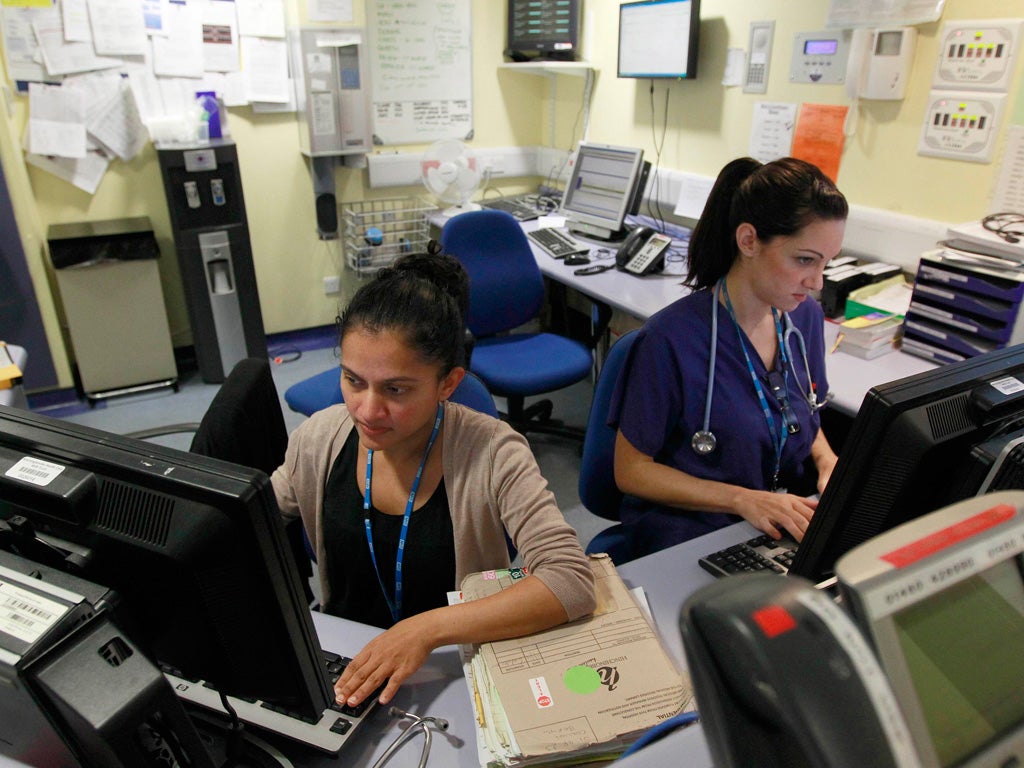Will profits come before patients in a hospital run by a private company?
Oliver Wright explores the ramifications of this week's groundbreaking NHS deal

Your support helps us to tell the story
From reproductive rights to climate change to Big Tech, The Independent is on the ground when the story is developing. Whether it's investigating the financials of Elon Musk's pro-Trump PAC or producing our latest documentary, 'The A Word', which shines a light on the American women fighting for reproductive rights, we know how important it is to parse out the facts from the messaging.
At such a critical moment in US history, we need reporters on the ground. Your donation allows us to keep sending journalists to speak to both sides of the story.
The Independent is trusted by Americans across the entire political spectrum. And unlike many other quality news outlets, we choose not to lock Americans out of our reporting and analysis with paywalls. We believe quality journalism should be available to everyone, paid for by those who can afford it.
Your support makes all the difference.The Circle Healthcare group's flagship hospital in Bath was designed by Norman Foster, is run like a hotel and includes an award-winning restaurant for patients and visitors.
But for the patients and staff at Hinchingbrooke hospital in Huntingdon, the decision yesterday to hand it over to the privately run Circle is unlikely to result in such a tangible transformation.
Critics warn that profits may be given priority over patient care, as the company struggles with the same financial problems that beset the NHS management.
Until now the only experience Circle has had of the NHS is running two private treatment centres, carrying out specific routine procedures for a fixed price. Circle's other hospitals, such as Bath, are primarily focused on the private healthcare sector which pays far more than the NHS per patient and still provides most of the company's revenues. These hospitals have been designed and built from scratch which has allowed Circle to think about how they should be organised.
In Bath, the nine consulting rooms and four day treatment rooms come off a 30ft-high atrium dominated by a café and restaurant. There are no emergency admissions, and the hospital concentrates on a narrow range of operations and procedures – where demand can be controlled and resources managed.
By contrast, Hinchingbrooke's buildings are more than 25 years old, and are ill-equipped to deal with the demands of modern healthcare. The hospital provides NHS services to a population of 161,000, and Circle has promised to maintain those services. Successive managements and government intervention have failed to make a dent in its £2.6m-a-year deficit. Circle says it can create an efficient hospital with a three-pronged plan.
Firstly, Hinchingbrooke employees will benefit financially from the turn-around. Circle is described as the John Lewis of healthcare because employees have a financial stake in the company.
Secondly, Circle's operating system is based on delegating power down. Staff are divided into clinical teams that meet each month and analyse four sets of data: clinical outcomes, a patient questionnaire, staff feedback and productivity data.
Ali Parsa, Circle's founder and chief executive, says everyone in the team has an onus and power to change things if they believe they can improve the operation. "You've got a choice: you can deal with a problem or ignore it. There are not the same incentives or disincentives to deal with problems at other hospitals. We model ourselves on the airline industry where safety and service – or in our case patients' outcome and satisfaction with care – are the key to profitability," he said.
Circle believes that while it may not be able to transform Hinchingbrooke into a hospital like Bath overnight, its 10-year contract will allow it to invest to make it more attractive to patients.
If Circle succeeds, other NHS hospitals are likely to be handed over to the private sector. But if it fails it will be politically toxic for the Government, and give weight to the argument that a private-sector model is unsuitable for NHS service provision.
Ali Parsa: From Goldman to healthcare
Ali Parsa, Circle's founder and chief executive, arrived in Britain, aged 16 and speaking no English, as a refugee from Iran.
He took A-level correspondence courses and went on to study engineering at University College London – becoming the first foreign student elected to the executive of the National Union of Students.
After leaving, he worked in finance first at Merrill Lynch and then later as executive director of Goldman Sachs' European technology investment banking team. He set up Circle in 2004 with Massoud Fouladi, an ophthalmologist friend who had become disillusioned by the management of private and NHS healthcare.
Circle now operates three hospitals and one NHS treatment centre and has plans for further expansion.
Mr Parsa says healthcare is ripe for economic reform: "During the 80s we re-engineered our financial services industry and in the 90s our technology and telecommunications industries were transformed. There is no reason why in this decade we can't do the same with healthcare."
Join our commenting forum
Join thought-provoking conversations, follow other Independent readers and see their replies
Comments